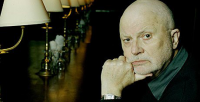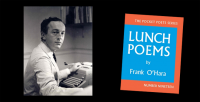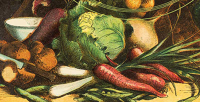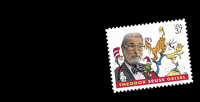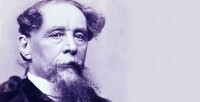Editor's note: Geoffrey Hill (1932-2016) was considered by many to be the finest poet writing in English of his time. His first poetry appeared in the early 1950s and his last book was published in 2012. His work is dense, lyrical, layered, scholarly, arcane, and sometimes not easily accessible, which makes the rewards of his poetry all the greater for those who take up its challenges. We asked Graham Shearing, an Englishman who has collected and read Hill for many years, to discuss his poetry, and Jett Whitehead, a specialist in modern poetry, to discuss editions of Hill's works. GRAHAM SHEARING: Around 1980 I was in a bookshop in Bath, England, when I first found Geoffrey Hill's Tenebrae, then two years since its publication. I was struck by the design of the wrapper and the magical word Tenebrae, with its liturgical associations. I bought one other book, of somewhat lubricious poetry, that day, by a now-forgotten poet (as is so often the case). But I devoured the Hill on the bus back to Downside Abbey, some miles away... the rattle of the bus drowned out in my mind by the force of his “Lacrimae, or, Seven tears figured in seven passionate Pavans” and its deliberate evocation of John Dowland's music. Tenebrae : Andre Deutsch, 1978. paper covered boards, dust jacket. 8vo. paper covered boards, dust jacket. 48 pages. First edition. Duff Cooper Memorial Prize winner 1979 wrap-around. Poetry Society leaflet loosely inserted. Fine. (Offered by Oak Knoll Books) I returned to ... [more Reading & Collecting Geoffrey Hill]
Personal confession: normally I am a proponent of all types of blogging. Though I believe the (not-so-old) adage “Don't believe everything you read on the internet,” I also find the internet to be a most useful place for information. Some of it genuine… some of it not quite so genuine… some of it kind, some of it negative. In any case, the internet is a fount of information. And I do use it – boy, do I use it! However, that being said, there is one thing that I cannot make up my mind on how I feel about it. The internet is partially responsible (in my own humble opinion) for making one particular genre of published book not quite as popular anymore. Travel Writing. Nowadays, just about anyone can and does post just about anything they want online. They went on a hike with their girlfriend and found a killer “secret” camping spot? Let's tell the entire online world! (Not so “secret” anymore – so much for skinny dipping!) Did you travel to Versailles with your parents and take pictures of every single item of gold you saw? Post them to Facebook! Gone are the old days where someone went on adventures that others might never experience and went home to write colorful and descriptive tales about their travels. Travel writing had to be good enough, exciting enough and gripping enough to spend money to publish it – it had to appeal to the masses. Now don't get me wrong – I love to travel and always want to write about my “adventures” – but I would rathe... [more Has Blogging Killed Travel Writing?]
I first met the poet Frank O'Hara in the early 1990s. I was in the process of abandoning the writing program I was enrolled in at a local university for the much less muddied waters of the religious studies department; and, for his part, Frank had been dead for a little over twenty-five years. Frank O'Hara died at 8:50 p.m. on July 25, 1966 at Bayview General Hospital on Long Island. Mark Ford, editor of O'Hara's Selected Poems (2008) , succinctly describes the events of the previous evening, a night O'Hara spent with his friends Morris Golde, J. J. Mitchell, and Virgil Thomson clubbing on Fire Island. “The beach taxi in which he and his friend J. J. Mitchell were traveling broke down. As they waited for a replacement to arrive, a Jeep approaching from the opposite direction swerved to avoid the stranded taxi and travelers, and it struck O'Hara.” Frank and I met in a seedy bookshop on campus, a second floor walk-up promisingly dubbed Ice 9. In the airless front room of the shop were displays of toe-curlingly pornographic photo collections, dusty issues of Re/Search featuring Throbbing Gristle and Brion Gysin, and excitingly garish works by Kathy Acker, Jack Black (hobo author of You Can't Win fame), and J. G. Ballard. Perusing the makeshift shelves in the smaller rear room I came across a small display of poetry titles including a healthy dollop from the City Lights Pocket Poets Series. Ginsberg, Ferlinghetti, Kerouac, I ran my finger across the familiar spines. But ho! W... [more Frank O’Hara in 1966]
The Lilly Library, Indiana University, has announced its summer exhibition. “Eat Your Vegetables! Five Centuries of Vegetarianism and the Printed Word” will survey the history and impact of vegetarian movements on society, and it will also contain a variety of cookbooks that emphasize vegetarian cuisine. The materials in this exhibition are drawn from many of the Lilly Library's collections, most notably the collection of books, pamphlets, and other materials on the history of vegetarianism formed by ABAA-member William Dailey (William Dailey Rare Books Ltd), as well as the Dr. and Mrs. John Talbot Gernon Cookbook Collection. The exhibition will be on view in the Main Gallery of the Lilly Library from July 21 to September 10, 2016. The Library will formally open the exhibition on July 21 at 5:30 p.m., with a talk by William Dailey entitled “Pythagoras to Gypsy Boots: Collecting Vegetarian Literature, 1547 to 1967.” Mr. Dailey's presentation will be followed by a reception featuring a variety of tempting vegetarian food. William Dailey, a native of Evansville, Indiana, is a noted antiquarian bookseller and collector, and his gift to the Lilly Library of materials from his collection provided the inspiration for this exhibition. Learn more about the exhibition... [more William Dailey on Collecting Vegetarian Literature]
Reported missing: a first edition of LOLITA, likely removed from its custom box and taken from RLD Books in Kennett Square, Penna. on either 16 June 2016 or 17 June 2016. Nabokov, Vladimir. LOLITA. Paris: Olympia Press, 1955. First edition. 12mo. Original green wrappers. 188/223 pages. Very good. Prince on back of vol. 1 has sticker with new price 1200 fr. Prince on vol. 2 is 900 fr. indicating title is correct first edition. Light edgewear to spines and previous owner's name on ffep of vol. 2. Some pencil notations to penultimate end paper in rear of vol. 2. Top half-inch corner of vol. 2 back cover is missing. Overall an attractive set of this fragile classic. (Protected by Mylar jackets. REMOVED from custom box.) If you are offered the book, please contact Roz duPont RLD books 111 S. Union St Kennett Square PA ph (610) 444-8334 roz@rldbookstore.com [more Missing from Kennett Square, PA]
If someone says “Children's Books” to you, what is the first thing that comes to your mind? Picture books? Perhaps here is the better question… what author first comes to mind? I would venture to bet that at least 90% of you come up with the same name. However, did you know that the name you come up with is not his true name? (Probably most of you do, since you are members of the book world or bibliophiles and would know something like that… but humor me!) Theodor Seuss Geisel was born on March 2nd, 1904 to a German family in Springfield, Massachusetts. His father ran a family-owned brewery in Massachusetts (well, until the Prohibition did away with that). Geisel went to school in Massachusetts until he went to Dartmouth College in New Hampshire, graduating in 1925. During his time at Dartmouth, Geisel first showed skill and interest in humorous literature as rose to the role of editor-in-chief of the literary magazine the Dartmouth Jack-O-Lantern before graduating. Unfortunately, one college incident threatened to end his early literary career – when Geisel was caught drinking gin (the Prohibition was in effect) in his dorm room with some of his friends. In punishment for this crime, Geisel was forced to resign from his position at the magazine. In order to continue publishing his work at the Jack-O-Lantern, Geisel began writing under the pen name “Seuss”, his middle name. The beginning of Dr. Seuss was underway. Once graduating from Dartmouth, Geisel began his... [more Dr. Seuss: Rare Books & Ephemera]
ABAA-member Jennifer Johnson of The Book Shop in Covina, CA, has been awarded a Young Antiquarian Scholarship by the Hungarian Antiquarian Booksellers' Association to attend the International League of Antiquarian Booksellers' (ILAB) Congress in Budapest in September, 2016. ABAA-President Mary Gilliam writes of Johnson that “Ever since joining the Association, Jen has been very supportive of, as well as involved in, Association activities, e.g, serving on the Southern California Book Fair committee, and organizing the now ever-popular Poker Tournament, which has raised ~ $15,000 for the ABAA Woodburn Educational Fund." "Jen represents the next generation of booksellers, and epitomizes the type of bookseller to whom we wish to entrust our beloved trade; e.g., along with , they broke new ground in terms of identifying and compiling archives, one example of which is their Heavy Metal catalogue of 2014, the first of its kind, which sold en masse to an institution who also recognized their vision of documenting a modern day musical movement." Johnson said she is “honored and proud to be selected and can't wait to share my experiences with everyone." A native of Nebraska and a graduate of Pepperdine University, Johnson is a former newspaper reporter and public relations executive. She became an associate member of the ABAA in 2010 and a full member in 2016. The ILAB Congress takes place in Budapest, Hungary from September 21 to 23, 2016. [more Johnson Awarded Young Antiquarian Scholarship]
Maxwell Perkins was the most famous editor of the golden age of American letters, working with Ernest Hemingway, Thomas Wolfe, Marjorie Kinnan Rawlings, F. Scott Fitzgerald, and many others. Rather than attempt to compress his mammoth career into two hours, the new film Genius, starring Colin Firth and Jude Law, focuses on Perkins relationship with Thomas Wolfe, perhaps his most gifted author, but also his greatest challenge. ABAA members offer many interesting items connected to Maxwell Perkins and his stable of famous authors, from glamorous first editions and rare books, to unexpected ephemera like mundane letters between the editor and various literary executors. Carolina Folk Plays: Second Series. Edited with an Introduction on Making a Folk Theatre by Frederick H. Koch New York: Henry Holt and Company, 1924. First edition. Thomas Wolfe's first appearance in a book, following the separate publication of his "Crisis in Industry.". 8 photographic illustrations including one which shows Wolfe portraying Buck Gavin, two woodcuts by J.J. Lankes and another by Mary De B. Graves. xxxiv, 173, pp. 1 vols. 8vo. Original buckram, lettered in green. Fine in pictorial cream dust jacket, with small loss on top of front panel, with price change on front cover from $1.75 to $2.00. In blue cloth box and chemise. Contains Thomas Clayton Wolfe's first play. Written for his dramatic writing course, the "Carolina Playmakers" taught by Frederick H. Koch. When it was produced in March 15 and 1... [more Max Perkins: Genius Editor]
Charles Dickens was only 58 years old when he passed away. He had long pushed himself too hard for the love of his work and his followers, and in the summer of 1870 (June 9th, to be exact) he succumbed to exhaustion and after experiencing a fatal stroke, was laid to rest. His work, however, has gone on to be remembered since, and the author has never been out of print. His final work, The Mystery of Edwin Drood, has long fascinated fans, as the murder mystery was unfinished at his death and Dickens never (formally) named the murderer. On this the 145th anniversary of the author's death, we look at his last years and his final work – a novel that he persisted on writing, even while suspecting his end was near. Dickens' health began to decline when he was involved in the Staplehurst rail accident on June 9th 1865 (five years to the day before his death, coincidentally). On his return from Paris with his young mistress Ellen Ternan and her mother, the train they were traveling on plunged off a cast iron bridge that was under repair. Luckily, the only 1st class carriage to remain on the track was that one in which Dickens was traveling. Until more aid arrived to tend to the victims, Dickens scrambled around the horrific scene offering brandy and a hat with water, looking after the dead, dying and wounded around him. The tragic incident cast a shadow on Dickens' life – the horror and absolute panic he experienced led to sleepless nights and night terrors for the rest of his sh... [more Charles Dickens’ Final Chapter]
These items are still missing as of 6/14/2019. The following books have gone missing from a locked display case at the Cortez Street Emporium, in Prescott, Arizona, sometime between May 9th and May 25th: MacDonald, Ross (Kenneth Millar). The Blue Hammer (Author's Proof Copy, Annotated). New York; Alfred A. Knopf, 1976. First edition, octavo; an uncorrected proof copy in yellow printed wrappers. The author's own copy with more than 60 holograph corrections to the text, in pencil. Page references for all of these corrections are given in pencil on the front wrapper, by MacDonald. Laid in are two pages of typed corrections to the text, signed "B" with quirky little remarks to MacDonald, prepared by fellow mystery writer William Campbell Gault, who is the dedicatee of the book and here a proof reader. A fine copy housed in a custom leather-backed clamshell box. Faulkner, William. Idyll in the Desert. New York; Random House, 1931. First edition, number 388 of 400 signed by the author; red marbled boards, with paper label on front board. Near fine, lacking the glassine dust jacket. Please contact the ABAA if offered. [more Missing from Prescott, Arizona]


